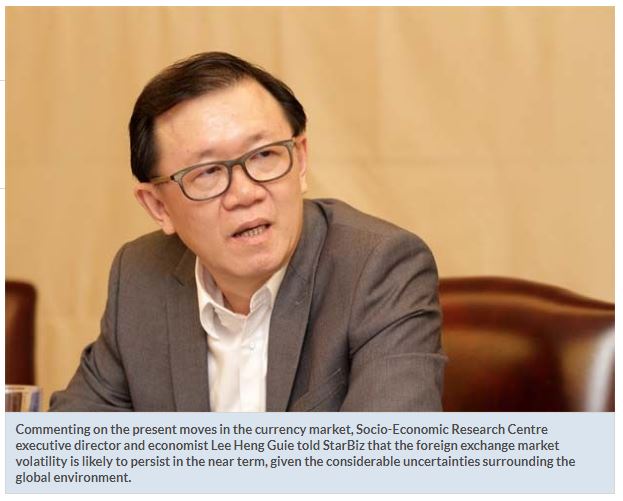Malaysia: Trade war pushes ringgit to new low for the year
PETALING JAYA: The ringgit has hit a new low for the year, following continued uncertainty from the ongoing US-China trade war which has intensified over the past few days.
The ringgit fell to 4.17 against the US dollar in yesterday’s trade, in line with the weakening seen in other regional currencies after the rise of the greenback.
The dollar index, which measures the exchange rate of a basket of currencies to the US dollar, rose to near its year high as well to 97.523 as at press time.
Commenting on the present moves in the currency market, Socio-Economic Research Centre executive director and economist Lee Heng Guie told StarBiz that the foreign exchange market volatility is likely to persist in the near term, given the considerable uncertainties surrounding the global environment.
“Topping the list is the ongoing intensity of the trade spat between the US and China, the geopolitical risk in the Persian Gulf and Iran, as well as the state of the global economy, especially the US and China. The ringgit has not been spared from the pressure developing in the global financial markets inflicted by the intensity of trade tensions between the US and China,” Lee said.
“In recent weeks, the ringgit has succumbed to weakness, largely dragged by portfolio outflows in both equities and bonds on worries over Malaysia’s possible exclusion from the World Government Bond Index (WGBI) pending the review come September,” he added.
Lee noted that while Malaysia’s economic growth has increased moderately in the second half of 2018, he is not expecting the first-quarter gross domestic product (GDP) growth to pull back sharply from the 4.7% growth that was registered in the fourth quarter of 2018.
The GDP figures will be released by Bank Negara today.
“Bank Negara’s Monetary Policy Committee statement dated May 7 has provided guidance that latest developments point towards moderate economic activity in the first quarter of 2019,” Lee said.
“We estimate real GDP growth to be around 4.4% in the first quarter, underpinned by decent consumer spending, continued growth in the services and manufacturing sectors as well as higher agriculture output. Private investment growth is expected to remain subdued, given the cautious investor sentiment about both external and domestic conditions,” he added.
On a related matter, Fitch Solutions Macro Research said in its report yesterday that it forecasts real GDP growth for Malaysia to be at 4.2% for the full year of 2019.
“We believe that investment growth will remain subdued amid policy and political uncertainty. Particularly, the Pakatan Harapan government still does not appear to have coalesced into a united entity,” Fitch said in its report.
It said that there is also still uncertainty pertaining to the government’s stance towards Mainland China’s investment and a labour crunch putting upward pressure on wages, particularly in the services sector.
Fitch is expecting that government spending would likely slow over the coming quarters, as it continues to prioritise the paying down of public debt.
The fall in the ringgit has inadvertently also helped aide export-oriented stocks that also have the potential to gain from the trade war environment.
Glove-makers, for example, topped the gainers’ list in yesterday’s trading session (see story on page 4).
TA Securities in its report yesterday said that the US dollar has a stronger outlook for the time being due to its ‘safe haven’ status.
The research house said that there is also a likelihood of China pursuing a weaker yuan strategy, moving forward.
Commenting on the trade relations between the US and China further, TA said China doesn’t have much fire power in terms of trade to react to the US’ tariff hike, as it only imported US$120.3bil worth of goods from the US last year compared to the latter’s US$539.5bil from China.
It noted that setting higher than a 25% tariff on its limited US imports to match the magnitude of the US’ absolute impact would be self-destructive.
“Thus, post-imposition of the 25% tariff on US$60bil worth of goods, there is nothing much left to retaliate in terms of trade, if the US follows through with the tariff hike on remaining imports from China,” it said.
However, TA said that China may pursue other options such as imposing tariffs on the services sector, going tough on US investments in China, dumping the US$1.13 trillion worth of US treasuries it holds or even devaluing its currency, which is highly likely.
Source: https://www.thestar.com.my/business/business-news/2019/05/16/trade-war-takes-its-toll-on-ringgit/#yzpvT403hvXaImJp.99


 Thailand
Thailand




